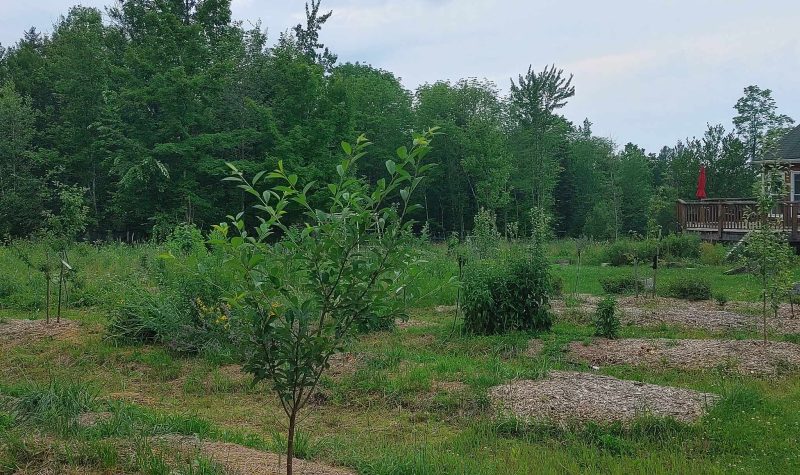After a successful first event, the West Bolton Agri-Food Citizens Committee is coordinating a second forest outing - reserved for West Bolton residents - on Mont Foster on July 15.
The West Bolton Agri-Food Citizens Committee organizes a variety of activities for West Bolton residents, including seed exchanges. It coordinated its first forest outing in May with the goal of bringing people together and introducing residents to the natural riches that can be found in their own backyard.
Christiane Tetreault, whom leads the citizens committee, said that the committee wants to continue helping residents develop knowledge about the nutritional and medicinal benefits of the many plants that can be found in the forests, and to build a sense of community through these experiences. Also taking into consideration that people are spending less time in nature and facing food price inflation, these forest outings benefit West Bolton residents in more ways than one, according Tetreault. Through its work, the West Bolton Agri-Food Citizens Committee hopes to inspire other municipalities to organize similar initiatives for their communities.
“It’s easy to go to a store and buy things, but we are a small community and we can share. For example, if you have too many seedings of something why not give it to someone and taking something else? I think that we’ve forgotten through the years to do that. I think people have become individualists, so it’s really to build that and to show to people that we have a lot of things to eat,” explained Tetreault.
Tetreault added that there was high demand from West Bolton residents for the activity, one of many reasons why it decided to do the outings.
“These days, I think we have multiple occasions to be isolated and to live through social media - that’s not real life. This activity gives the opportunity to people to meet other people, our neighbours, and spend time in nature. In addition, with the current inflation, it is very nice to find out that we have free, organic, groceries and a pharmacy in our own backyard,” she emphasized. “I know the goal isn’t that everyone in the group will only eat through the forest throughout the year but if each person in the group tries one plant that they discover, for me this is already huge.”
The forest outings are all about discovering what the committee calls “non-timber forest products,” anything edible or useful that is found in the forest and that is not wood.
“As we walk in the forest, we stop for each plant that is edible or useful for our health. We discuss where to find them, (…) about health benefits, side effects, how to prepare it. If we can eat that plant raw, then people can try it on the spot,” mentioned Tetreault. “As an example, we all know the dandelion. It is a miraculous plant that everyone knows, but no one knows the power of that plant. It is full of vitamins, minerals, and fibre. We can eat the leaf, the root, the flower, so the entire plant. Dandelions promote liver health and also fight inflammation, this is amongst a lot of other benefits.”
On the first forest outing, Tetreault noted that the committee and those that participated in the event found 30 plants within three hours. She said that participants were left "impressed" with what they could find in their own backyard.
“What I read is that we have about 300 non-timber forest products in Quebec, it’s a lot. (...) They bring vitality because of their high nutrient content, vitamins, minerals; they are nutritional treasures. (…) One of the examples is nettle. Nettle has three times more iron that Spinach,” she highlighted.
Throughout the forest outings, the committee takes inventory of all of the plants its finds. Tetreault said that having the chance to explore nature peaks people's curiosity and helps participants discover a subject that they oftentimes don't have the opportunity to learn about, including herself.
“I take pictures and I do a file on them with the benefits, the side effects, and everything. I do a summary of what people learned to ensure that it is documented,” said Tetreault. “As a funny story, when I first arrived here I knew that some plants were miracles. My neighbour gave me a plant but I couldn’t keep it because it died. As I was walked in my forest, I had plenty of them.”
Tetreault emphasized that while it is of upmost importance to the committee to transmit knowledge and to provide people with these type of experiences, it it needs to done in respect to the environment.
“It’s really to pick people’s curiosity, to transmit knowledge, and learning to respect the environment through eco-responsible pick-up - that’s really important to us,” she explained. “As an example, if a wild plant is a slow grower or a [threatened species] then do not touch it. Also, only pick a quarter or a third of the plant so that the resources still exist in the wild and they continue to grown. Finally, only pick what you use.”
The second forest outing on Mont Foster will be similar to the first outing, according to Tetreault, but there will be more opportunities for discovery.
“It’s on different land. That part [of Mount Foster] is on the upper side of West Bolton. As we move along in the summer, new plants are coming, new plants are available. Some we cannot find in May but we can find them in July. It’s to have more variety and to find out about different plants,” she said.
In addition to the forest outings, the West Bolton Agri-Food Citizens Committee has other future activities in the works for West Bolton residents, including building an edible forest garden.
West Bolton residents seeking more information on the West Bolton Agri-Food Citizens Committee and its activities can contact Tetreault at ccabo2022@gmail.com
Listen to the full interview below:


